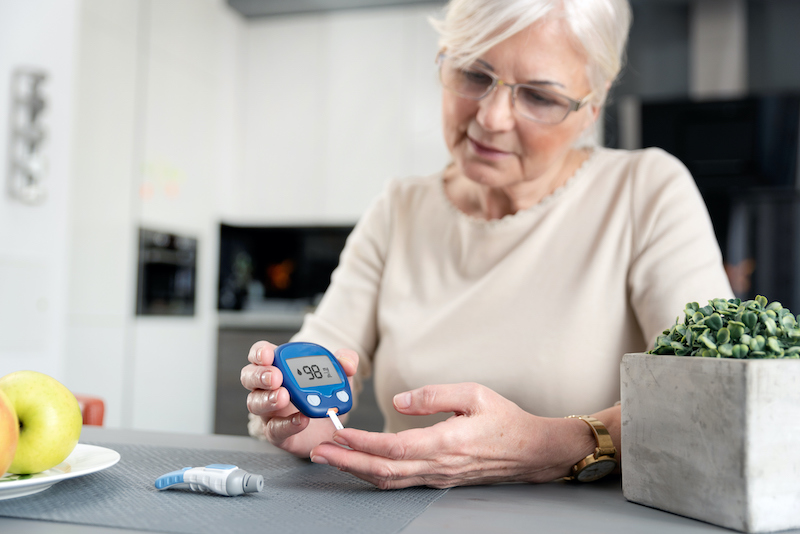
Diabetes in seniors is common. Learn tips to manage the disease and maintain health.
Checking glucose levels. Injecting insulin. Carefully watching your diet. If this describes an average day in your life, or that of a senior you love, you know firsthand the obstacles that come with a diagnosis of diabetes. As November is Diabetes Awareness Month, the aging care team at Live Free Home Health Care is pleased to share the following information regarding diabetes in seniors.
What Does It Mean to Have Diabetes?
In a nutshell, our bodies convert some of the foods we eat into glucose, which supplies the energy we need – but only if our bodies make enough of the hormone insulin to break down the glucose for our cells to be able to access it. Diabetics’ bodies are either unable to make enough insulin (type 1 diabetes), or are not able to utilize the insulin correctly (type 2 diabetes), leading to an excessive amount of glucose in the blood.
Left untreated, diabetes may bring about serious health issues, such as nerve, eye, and kidney complications, heart problems and stroke, and in some cases an increased risk for Alzheimer’s or cancer.
What Are the Symptoms of Diabetes?
Many individuals with type 2 diabetes have such mild symptoms, or symptoms that come and go, that they don’t even recognize there is an issue until the disease progresses and symptoms intensify. Signs to watch for include:
- Tiredness
- Increased thirst and/or hunger
- Loss of weight
- Blurred vision
- Frequent urination
- Slower healing of bruises and cuts
- Skin infections
It is important to talk with the physician if these symptoms become apparent.
Can Diabetes in Seniors Be Managed?
The good news is, once identified and effectively treated, and with adherence to changes in lifestyle, diabetes can be managed and controlled. For some people, adjustments to exercise and diet are sufficient, while others require medication and/or insulin injections.
Your doctor will put together a diabetes management plan to implement, that may include:
- How and when to track sugar levels
- Which foods to eat and which to avoid
- Physical activities and exercises
- A medication regimen
Strategies to optimize health while managing diabetes include:
- Manage your cholesterol and blood pressure levels, and have them checked on a routine basis.
- If you smoke, quit.
- Get annual flu and pneumonia vaccines, as well as annual kidney and eye exams.
- Check the feet every day to look for red patches, sores, calluses, blisters, as well as other skin abnormalities, and see a podiatrist with any concerns.
- Keep skin clean, protected, and moisturized.
- Ask the doctor for guidelines on cancer screenings, as well as for help with any other physical, emotional, or mental health concerns being experienced.
Live Free Home Health Care can help those with diabetes in lots of ways, including transportation to medical appointments and procedures, meal planning and preparation in accordance with nutritional restrictions, medication reminders, and more. Contact us at 603-217-0149 for a free in-home consultation for additional details on our Franklin adult day care services and the surrounding communities we serve.
